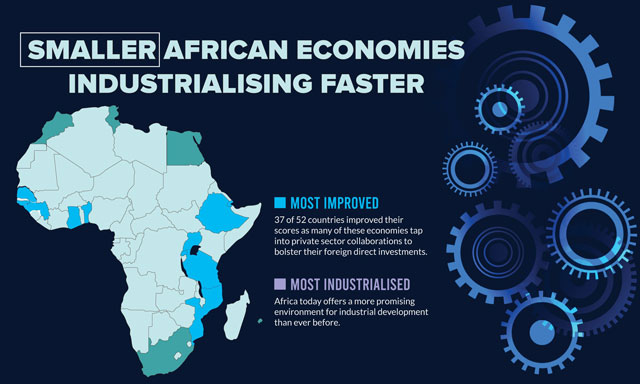
Smaller African countries are punching beyond their weight to diversify their economies from agricultural dependence, a new report shows.
Nairobi, Kenya | BIRD AGENCY | A new report shows that value-add factories and public-private partnership are helping small African countries industrialize much faster than their larger peers.
The recently released Africa Industrialization Index report by the Africa Development Bank found that these small countries have significantly increased manufacturing activities over the last decade to diversify their economies from agricultural dependence.
In addition to assessing economic performance, the index evaluated direct determinants like labour and capital and indirect determinants like macroeconomic stability and existing infrastructure, across 52 African countries.
Ten countries were listed in the index as having improved their ranking by five or more places since 2010.
“Countries in the bottom quintile recorded the highest improvement over the coverage period, with 9.7 per cent gains, followed by the lower-middle quintile (9.5 per cent),” according to the report.
Six of the ten top performers were small economies, including Djibouti, which made the biggest jump – by 17 places to position 33 – followed by Benin, which moved 14 places to settle at the 18th position owing to strong capital investment and sound policies.
Mozambique moved up seven places to position 30; Guinea moved up six places to position 40; Rwanda and Uganda both moved up five places to positions 35 and 20, respectively.
The biggest performance driver for small countries was their capacity to produce and export goods and services, which grew by 16.4 per cent, followed by middle-ranked countries (10 per cent).
Comparatively, while bigger economies also made some progress in industrialising their economies, they performed poorly on all indicators, meaning new, existing industries and businesses could not attract more capital and labour to support their growth.
“The top quintile is the only one reporting a decrease in its score (- 0,9%), owing to a serious deterioration in the direct determinant component (capital and labour),” said the AfDB
In overall performance, South Africa maintained the highest ranking throughout the 2010-2021 period, followed closely by Morocco, which held second place. Rounding out the top six were Egypt, Tunisia, Mauritius, and Eswatini.
Other bigger economies like Kenya improved ranks by two places to the 9th position while Ghana moved five places to the 19th position.
Over the coverage period, 37 of 52 countries improved their scores as many of these economies tapped into private-sector collaborations and bolstered their foreign direct investments.
For instance, Ghana, Ethiopia and Mauritius have started working with the private sector to identify and support infant industries. These countries are also coming up with new policy instruments that enable them to make targeted investments in infrastructure and skills, help firms access capital, technology and export markets, and broker linkages between manufacturers, investors and customers.
“While these initiatives remain at an early stage, there is good reason to believe that interventions of this kind are essential for kickstarting Africa’s industrialisation,” according to the report.
New industries like leather and pharmaceutical are also emerging in East Africa as Ethiopia, Rwanda, and Morocco begin to build networks of industrial parks and special economic zones (SEZs) to promote the growth of small and medium enterprises.
“While progress so far has been slow. Africa today offers a more promising environment for industrial development than ever before,” read the report.
Despite all these efforts, Africa’s industrialisation rate remains ‘disappointingly slow’ to compared to global manufacturing output. Africa adds value to only 14 per cent of its exports, compared to 27 per cent for emerging Asian economies.
*****
SOURCE: By Conrad Onyango, bird story agency
 The Independent Uganda: You get the Truth we Pay the Price
The Independent Uganda: You get the Truth we Pay the Price



